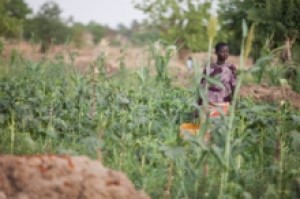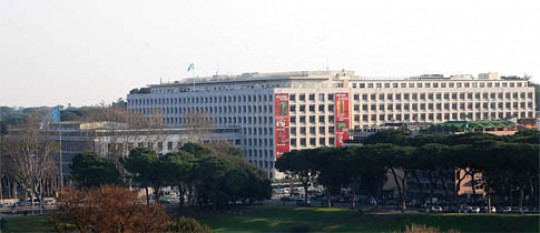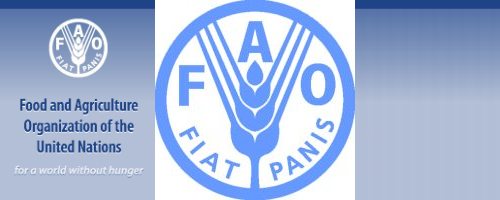Togo sees significant return on investment in agriculture. Farmers turn European support into profit.
Togo sees significant return on investment in agriculture
Farmers turn European support into profit
 Lomé, Togo/Rome – The European Union’s (EU) investment in agricultural rehabilitation in Togo has led to benefits that are almost double their cost, according to FAO. The Organization used EU funding to help Togolese farmers cope with high food prices and climatic adversities.
Lomé, Togo/Rome – The European Union’s (EU) investment in agricultural rehabilitation in Togo has led to benefits that are almost double their cost, according to FAO. The Organization used EU funding to help Togolese farmers cope with high food prices and climatic adversities.
Togo’s rural population suffered the most from floods and sharp increases in food prices that hit the country in 2007 and 2008.
These shocks exacerbated malnutrition in rural areas, where it was already high due to demographic pressure and the collapse of cotton cultivation, a major cash crop. In 2006, almost 50 percent of the population was underfed, according to figures from the UN World Food Programme.
In 2009, the European Union (EU) channelled €2.5 million through FAO to help over 20,000 of the most-affected Togolese farmers restart their production via the EU Food Facility, the Union’s worldwide response to the food price crisis of 2007-2008.
Two years on, there is a sea change, says Evariste Douti, Director for Agriculture, Livestock and Fisheries in Togo’s northern Savannah region, which had been particularly affected. “The people have produced enough for themselves,” he says.
Double return
Some 15,000 farmers have received seeds and fertiliser to grow staple crops such as maize, rice and sorghum, while 5,500 more got inputs for market gardening.
FAO estimates that the total value of what they have produced — 9,634 tonnes of maize, 675 tonnes of rice, 85 tonnes of sorghum, 3,522 tonnes of tomatoes, 350 tonnes of onions and 85 tonnes of green chillis — is €4.7 million, nearly double the amount invested by the EU.
“Our prime objective, to improve the level of nutrition and to increase the income of vulnerable farmers, has been accomplished,” concludes Alfred Andriantianasolo, FAO’s emergency coordinator in Togo.
The long term
In addition, the EU-funded FAO efforts also delivered structural support to Togo’s agriculture, in particular to its seed sector and the market information system.
Togo’s primary seed farm, which has the potential to produce quality seed for the whole country, was rehabilitated and provided with equipment. Its staff, as well nearly 300 seed producers, received training in the production and certification of quality seeds.
Furthermore, an information system covering each of Togo’s five provinces as well as the capital was put in place, allowing buyers and sellers to better monitor the prices of agricultural products.
“We have provided some oxygen to farmers,” says Marc Casterán, in charge of rural development at the EU Delegation in Togo. He perceives the EU Food Facility as a booster in helping Togo move towards long-term food security.
Structural support is crucial, he adds. “It will help to sustain the work done.”
###
> UN Food and Agriculture Organization (FAO).
The Food and Agriculture Organization of the United Nations (FAO) is an intergovernmental organization and has 191 Member Nations, two associate members and one member organization, the European Union. Achieving food security for all is at the heart of FAO’s efforts – to make sure people have regular access to enough high-quality food to lead active, healthy lives.

FAO’s mandate is to raise levels of nutrition, improve agricultural productivity, better the lives of rural populations and contribute to the growth of the world economy.
The Food and Agriculture Organization of the United Nations (FAO) is working with its Members and the entire international community for achievement of the Millennium Development Goals.
These eight goals – each with specific targets and indicators – are based on the United Nations Millennium Declaration, signed by world leaders in September 2000. They commit the international community to combating poverty, hunger, disease, illiteracy, environmental degradation, and discrimination against women.
![]()
The eight Millennium Development Goals are:
Goal 1: Eradicate extreme poverty and hunger
Goal 2: Achieve universal primary education
Goal 3: Promote gender equality and empower women
Goal 4: Reduce child mortality
Goal 5: Improve maternal health
Goal 6: Combat HIV/AIDS, malaria and other diseases
Goal 7: Ensure environmental sustainability
Goal 8: Develop a Global Partnership for Development
* More information at UN Food and Agriculture Organization (FAO)
###
> United Nations (UN).
 The United Nations was established on 24 October 1945 by 51 countries committed to preserving peace through international cooperation and collective security. Today, nearly every nation in the world belongs to the UN: membership totals 192 countries.
The United Nations was established on 24 October 1945 by 51 countries committed to preserving peace through international cooperation and collective security. Today, nearly every nation in the world belongs to the UN: membership totals 192 countries.
When States become Members of the United Nations, they agree to accept the obligations of the UN Charter, an international treaty that sets out basic principles of international relations. According to the Charter, the UN has four purposes:
- to maintain international peace and security;
- to develop friendly relations among nations;
- to cooperate in solving international problems and in promoting respect for human rights;
- and to be a centre for harmonizing the actions of nations.
###
* The above story is adapted from materials provided by United Nations (UN)
** More information at United Nations (UN)



















